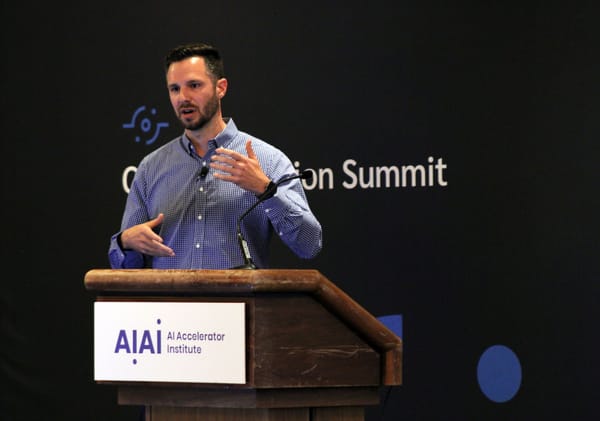This October, AI Accelerator Summit and Computer Vision Summit will touch down on the East Coast, as tech leaders from the world’s largest organizations and most exciting startups assemble.
AI Accelerator Summit, with its focus on hardware and optimization of AI system architecture, returns for the first time since 2020, whilst Computer Vision Summit explores the end-user landscape of machine vision technologies and its cutting-edge applications.
What’s the aim of these summits?
To share how industry leaders are creating, deploying, and scaling state-of-the-art intelligent technologies to create immense business value.
300+ AI practitioners will join 30+ speakers for a day of keynotes, panels, fireside chats, and workshops to hear how the technologies they’re deploying right now are transforming their business output.
Have a look at a few of the speaker and agenda highlights from each event below:
Computer Vision Summit
🗓 When: October 20, 2022
📍 Where: Boston
In just one day…
🔥 Survey the roadmap of vision technologies
🔥 Pick the brains of those scaling research applications to business impact
🔥 Gather actionable advice on reducing time-to-value
🔥 Discover the solutions facilitating the deployment of the state of the art
🔥 Conquer challenges in compute, data & rollout
🔥 Streamline customization for faster innovation
🔥 Understand computer vision requirements for next-gen applications
🔥 Bridge the gap between your engineers, strategists, and end-users
Speaker highlights 🎙
Panel Session: Camera vs LiDAR
The growth of ADAS and AD solutions is the catalyst for the adoption of several types of sensors being incorporated into vehicles. Radars, cameras, and ultrasonic sensors have become the industry standard.
And now, Light Detection and Ranging (LiDAR) technology has been added to the list and is actively being deployed in vehicles on the production line.
In this panel, leads from Zoox and Velodyne LiDAR will share their thoughts on best practices to use and will explore the factors that have stunted AV rollout in recent years.
Panel speakers:
Fireside Chat: Delivering the State-of-the-Art
There is no shortage of R&D, ML engineers, or data scientists.
So, what delays companies in producing state-of-art products and delivering these to their customers?
Join this fireside as our two guests discuss some of the major roadblocks in taking ideas on paper into action, and which software and hardware infrastructure their companies rely on to deliver AI products.
Panel speaker:
Deploying a Fully Autonomous Robotaxi
Zoox is not just building new vehicles, but it’s creating a new form of transportation. Through their autonomous vehicles, they will provide mobility-as-a-service in dense urban environments.
In recent times, they have unveiled they've reached significant landmarks in their journey to make these publicly available, recently testing with no one inside, no chase vehicle, and no emergency stop, all on open, private roads with non-Zoox agents, including pedestrians, cyclists, cars, and trucks.
Join RJ, Director of Perception at Zoox, as he explores the technology that has enabled their rapid progress to become one of the industry leaders in AV.
Panel speaker:
Other agenda highlights ⭐️
🚀 Driving Business Value Through Vision Technologies
🚀 Revolutionize Physical Retail With Computer Vision and AI
🚀 Computer Vision Infrastructure at Scale
AI Accelerator Summit
🗓 When: October 20, 2022
📍 Where: Boston
In just one day…
🔥 Immerse yourself in the AI hardware landscape
🔥 Survey the roadmap of AI accelerator technologies
🔥 Learn to build a scalable AI infrastructure stack
🔥 Gather actionable insight on reducing time-to-value
🔥 Refine your AI workflows for easier adoption
🔥 Optimize architecting AI systems
Speaker highlights 🎙
Compute and Data Training Requirements for AV
Today, even at lower levels of autonomy, connected cars generate around 25 Gigabytes of data per hour.
And as more self-driving features appear inside connected cars, the architecture required to make it all possible will become increasingly complex.
As Lotus gears up for the launch of its first assisted driving vehicles this year, Jan Wei Pan, their CTO, talks through some of the infrastructure requirements they have had to invest to scale these products.
Delivering AI at Scale
Without the correct compute, DevOps processes, and retraining, AI systems will fail at production.
And even of those that succeed, how do you then ensure that these systems can successfully be scaled and deployed en masse, especially when so much depends on the data you trained your models on - data that doesn't always align with real-world practice?
Join this session from Sreedhar, VP, AI Offers at Schneider Electric, to explore how he's ensured successful delivery of products across the housing, energy, and manufacturing industries.
Panel Session: Driving Business Value with AI
Many businesses pursue AI units, but not all of them make it work in terms of business return.
In this panel, our guests share how they've bridged the gaps between engineering, strategy, product, and leadership to make their AI units slot in seamlessly into their wider teams.
They'll share how their workflows work, and how they ensure the deployments of their tech are timed to meet demand and generate real business value.
Other agenda highlights ⭐️
🚀 The Compute and Development Processes Powering Alexa
🚀 Creating Total Business Efficiency with AI
🚀 Architectural Patterns & Machine Learning As An Engineering Discipline



 Follow us on LinkedIn
Follow us on LinkedIn


